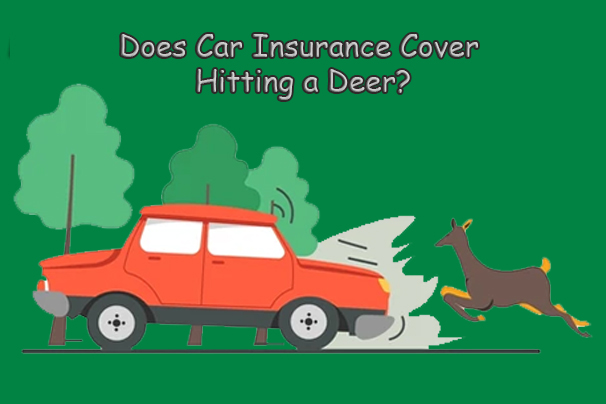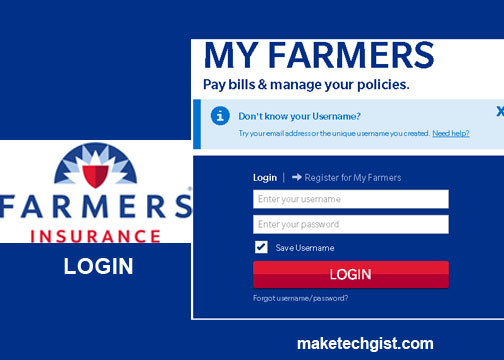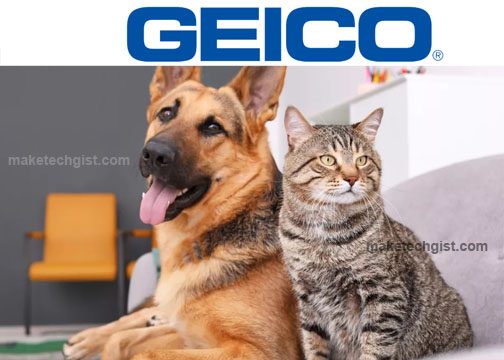You may be wondering if your car insurance will cover the repairs if hitting a deer damaged your vehicle. Unfortunately, crashes between cars and deer are not uncommon if you travel in an area where there are a lot of deer. Even when drivers are paying attention, deer could still collide with cars on the road due to their unpredictable behavior. When this happens, your car may sustain serious damage from the collision. So the crucial question is, does car insurance cover hitting a deer? Everything you require to keep safe is provided here, along with information on what coverage you should have.

Does Car Insurance Cover Hitting a Deer?
Your car insurance can cover damage from hitting a deer if you have comprehensive coverage. This coverage option gives your car physical protection and is typically combined with collision coverage. Let’s examine the specifics of auto insurance after colliding with a deer. This includes which companies provide the most affordable average quotes for the relevant policy levels, usual expenses. And what to do in the event of an accident. Experiencing higher rates already due to an earlier collision? To start your search for a better rate, enter your ZIP code above.
Comprehensive Coverage vs. Collision Coverage
So why does your car usually have comprehensive coverage and not collision coverage when it hits a deer? A deer running across a highway or rural road is an unpredictable and random event. Hitting a tree or another automobile is not the same. Additionally, comprehensive coverage aids in protecting your vehicle from harm caused by unforeseen, random events like theft, fire, vandalism, and collisions with wildlife. Conversely, collision coverage contributes to the cost of auto repair. This is if your automobile collides with another vehicle or an object (such as a tree or fence). In any case, it’s crucial to be aware that both types of coverage usually have restrictions and deductibles.
How Much Does Comprehensive Coverage Cost?
The cost of comprehensive coverage is determined by the value of your car, since it is intended to protect it. In this instance, your premium will increase in proportion to the value of your car. Our State of Insurance calculations are predicated on an average-cost vehicle, as we have said.
Your deductible is another characteristic unique to your insurance coverage that affects how much your premium is. The typical range of deductibles is $500 to $1,000, though this might change according to your insurance and the cost to your insurer. Pricing for a $500 comprehensive deductible is shown in the data above. Whereas pricing for a $1,000 deductible is shown in the data below.
Does Liability Car Insurance Cover Hitting a Deer?
If you hit a deer with your automobile, the liability element of your insurance will not pay for the damage. Only physical harm and property damage you inflict on another person or people in an accident are covered by liability insurance. Your liability insurance coverage will pay for any damage (up to policy limitations) that you do to another person’s property or vehicle. This is if you strike a deer, but it won’t pay for the repairs to your car.
Will I Have To Pay a Deductible After Hitting a Deer?
If you hit a deer, you’ll probably have to pay a deductible. You choose your deductible—the amount you will pay toward any covered events when you purchase your insurance policy. Generally, your deductible increases with the amount you pay for insurance coverage and decreases with the amount you spend to be insured. Your insurance provider might only provide you with the car’s cash value. However, if your vehicle is totaled—that is, if the cost of repairs exceeds the value of the vehicle. Because insurance policies and their conditions might change, it’s critical to review your coverage.
What Happens If I Swerve To Avoid A Deer?
Swerving to avoid a deer is not advised by the majority of auto safety experts. If you can’t slow down safely, swerving could result in a rollover accident, a multi-vehicle collision, or even you losing control of your car. Should you swerve to avoid a deer and collide with another vehicle, you might be held accountable for the incident and for any harm caused to the other vehicles. In this case, your collision policy might kick in if you have full coverage insurance, but it might be wiser to strike the deer than run the risk of a more serious collision.
How Can I Avoid Hitting a Deer?
Deer can be unexpected and move swiftly. This implies that even if you drive carefully, you could still run the risk of running over a deer if you reside in a region where deer populations are high. You could prevent a collision with a deer by following these suggestions.
Slow down
The majority of deer collisions happen in the fall, between nightfall and dawn. If you slow down during these periods, especially on dimly lit highways, you could have more time to respond if a deer does cross in front of you.
Look for deer on the road
Although deer like to blend in with their surroundings, keeping an eye out for their presence could help you avoid an accident. Reduce your speed and assume that there might be additional deer nearby if you spot one on the side of the road.
Put on your high-beam headlights
If there are no other cars in the area, doing so can help you see better and respond faster to any potential deer on the road.
Use your horn
If you run the risk of hitting a deer on the road, the Insurance Information Institute suggests giving them a single, long blast of your horn. But you run the danger of frightening the deer into the road if you do this before it has already crossed it. If you also do this, keep an eye out for other vehicles.
Final Thoughts
Any collision, even if you hit a deer, should be reported to the police, especially if someone is hurt. To help stop another collision, the police can also help remove the deer from the road. You can seek guidance by calling the non-emergency police phone line if you are unclear whether to file a police report following an accident. Move your car to a secure spot after a deer accident before getting out to inspect the damage.





